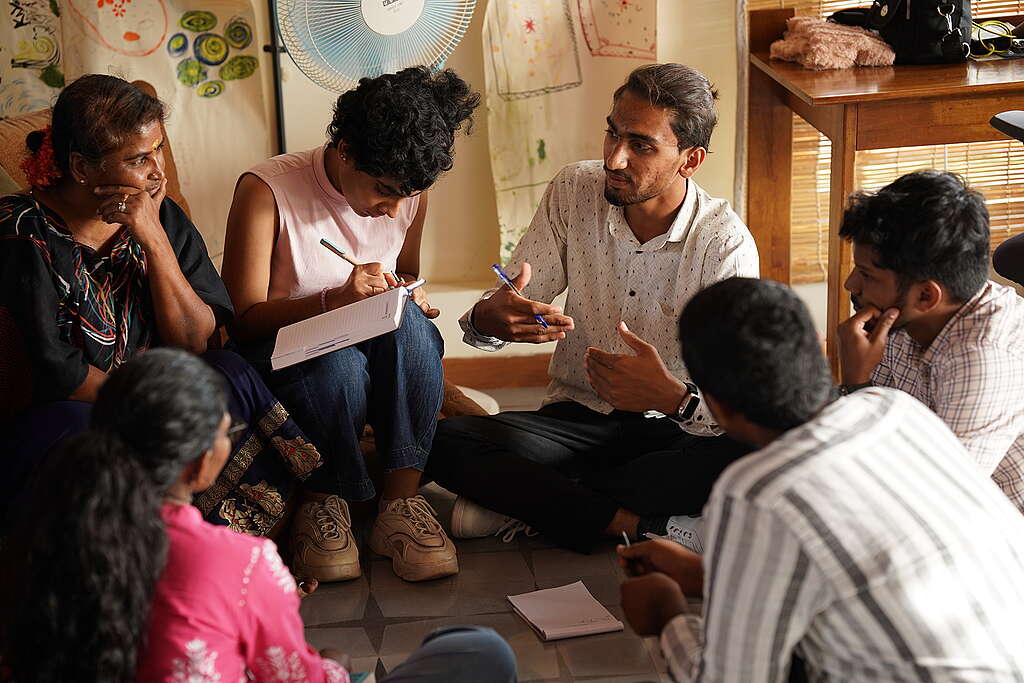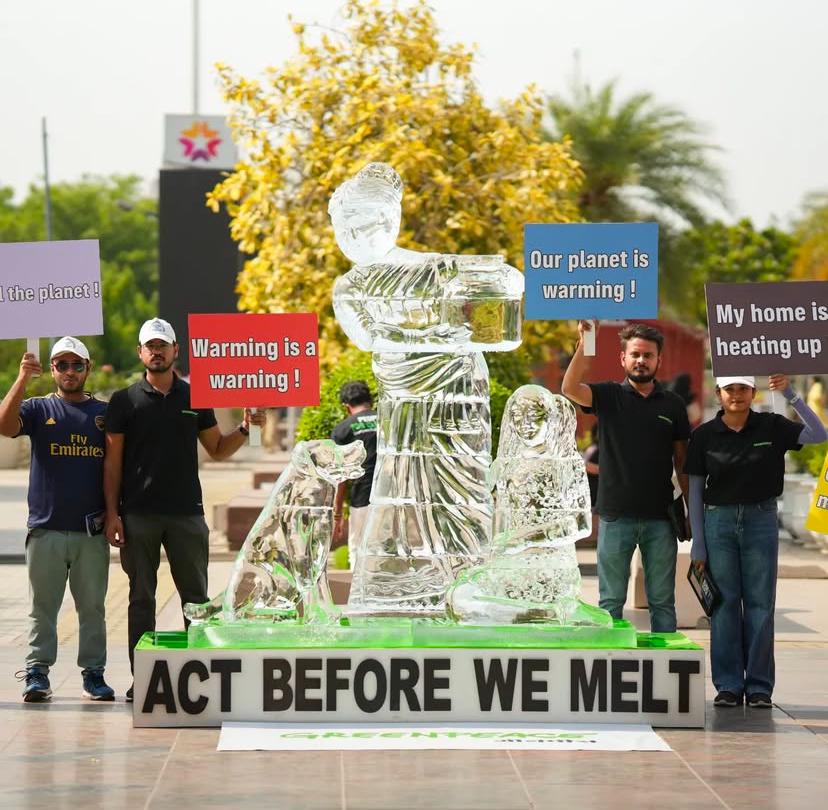Powering Change, One Action at a Time!
At Greenpeace, we recognize that real change is driven by the collective power of dedicated individuals. Our volunteers—environmental champions from diverse backgrounds—are the backbone of our campaigns, relentlessly working towards a greener, more just world. Whether advocating for climate energy, Biodiversity, or promoting Social & Economic justice, their commitment and passion fuel the momentum for impactful change. This platform is a tribute to their resilience, showcasing their transformative journeys and contributions. Here, we celebrate their achievements, share their challenges, and inspire others to take action. Together, we are not just imagining a better future—we are creating it.

Set up your own Cooling Point. Join #DelhiRising
Heat doesn’t discriminate, but relief often does. As temperatures soar across the city, community-driven cooling points are becoming a vital lifeline. Whether you’re a resident group, youth collective, school, or shop owner, you can be a part of the solution. Here’s how.
Human Library: Climate Conversations with Shri Dilip Pandey
Experience a thought-provoking Human Library session at Delhi’s Museum of Memories, where Shri Dilip Pandey, Member of the Delhi Legislative Assembly, shares his insights on the climate crisis. Through impactful storytelling, he discusses extreme weather patterns and the urgent need for climate action.
Voices of Change: Inspiring Journeys of Greenpeace Volunteers
Hear directly from the passionate changemakers at Greenpeace India. From hosting engaging webinars to leading impactful campaigns on the ground, our volunteers have been at the heart of driving change. Their journeys are filled with dedication, resilience, and inspiring leadership. Watch the full video to explore their stories and see how they are shaping a better future for our planet.
Join us and become a catalyst for meaningful change!
FAQ’s
Individuals above 18 years of age, who freely and willingly commit themselves to uphold and promote Greenpeace core values and work to support its campaigns without expecting any financial remuneration for their services.
A person who wishes to donate his/her time to support Greenpeace’s work voluntarily; a GPSA volunteer is not a regular fixed-term employee, nor a freelancer, and does not have an employee-employer relationship with GPSA
GPSA believes in building leaders within our volunteer pool, extending our constituency and building more meaningful relationships with our allies, coalitions, and the communities we work with.
As such, GPSA continuously develops retention strategies that would deepen volunteers’ involvement in our work, help strengthen their capacities for campaigning, and inspire them to take on bigger and bolder roles.
Commitment: Volunteers are expected to align with the organization’s philosophy, vision, mission and core values throughout the course of their journey with Greenpeace.
Integrity: GPIN volunteers should act with integrity. This means doing the right thing even without anyone looking, being honest and responsible at all times, including respecting the work environment, colleagues, etc.
Professionalism: GPIN treats its volunteers as professionals. GPIN expects a level of professionalism in volunteers’ comportment, attitude and work ethic.
Reliability: Each volunteer’s role is crucial in all of GPIN’s activities. Any volunteer who commits to take on a role or task is expected to be reliable and to provide advance notification in case of sudden unavailability.
Valuing people: Volunteers are expected to respect the opinions of others, accept and learn from the diversity of people, and show gratitude and appreciation for the people they interact with.
Building camaraderie: Each volunteer should take the initiative to build relationships with co-volunteers, Greenpeace staff, and other members of the Greenpeace community.
Adherence: Volunteers are expected to adhere to this constitution.
Reimbursement of Per Diem
Volunteers are entitled to receive allowances or per diem, as well as reimbursements when they incur expenses while undertaking GPSA activities.
Any expense related to volunteering tasks should be discussed and agreed on between the Task Manager or Public Engagement and Actions staff and the volunteer prior to execution.
The Task Manager or Public Engagement and Actions staff can provide the volunteers with a cash advance to cover projected expenses. After the activity, the assigned Task Manager or Public Engagement and Actions staff would be the one responsible in ensuring the cash advance is settled under GPSA’s Financial Policy.
Travel costs covered by GPSA consist of: airline ticket, airport transfers, ground transportation, accommodation, and meals. In normal situations, a designated coordinator of a particular project/event will arrange for the meals of volunteers, with a budget ceiling of GPSA’s per diem. In case the office is unable to arrange or provide meals, the volunteers shall be given the per diem in accordance with GPSA’s Financial SOPs (Standard Operating Procedures).
The breakdown of per diems are as follows:
Breakfast- 20%; Lunch- 30%; Dinner; 50%
Volunteers cannot claim advances or reimbursement for expenses that are not related to the GPSA activity, or the fulfillment of the task, for which they were deployed. Expenses incurred for personal items or activities, cigarettes, alcoholic beverages, or any illegal items or activities also cannot be claimed.
Volunteers are advised to consult the Task Manager or Public Engagement and Actions staff regarding financial policies (e.g. procurement policy, etc). Any misuse of Greenpeace funds shall be subject to appropriate disciplinary action.
Travel Costs and Insurance
GPSA will cover the travel costs for the volunteers while they are on official duty travel.
GPSA will also provide travel and medical insurance for all volunteers who undertake travel in the course of their tasks with the organization. (Note that insurance coverage may vary across GPSA offices due to differences in country standards and policies.)
Capacity Building – GPSA provides volunteers with skills training to ensure that they are well-equipped and able to undertake jobs and tasks. Likewise, GPSA expects that volunteers, after successfully completing a training, if willing and able, perform the necessary tasks/jobs as needed.
Employment Opportunities – In case of a job opening, volunteers are among the first to be informed, and if skills match the job, be provided with equal opportunity to apply.
Internship – GPSA’s Internship is open to all volunteers and interested individuals who have the passion and willingness to help our campaigns. The process of application would be based on the GPSA Internship Program.
Passion
free will
Be 18 years of age
Ability to communicate with others
Volunteering is an open commitment to better communities. We often rely on the intent and proactive efforts of individuals to reach out to GPSA. In addition, to effectively expand our volunteering pool, Greenpeace also conducts strategic and targeted recruitment through the following channels:
• Official social media sites and websites across the region;
• Public engagement initiatives such as, but not limited to, speaking engagements, social events, internal and external activities, and sign-up booths; and Promotion and testimonials from existing GPSA volunteers.
Greenpeace values and cares for its volunteers, who are considered vital members of the organization.
GPIN is committed to ensuring the safety, health and well-being of volunteers during Greenpeace activities. These include:
Full support and solidarity of the organization, at all levels, for those taking risks;
Prioritization of support for dangerous and emergency situations;
Best practice security planning;
Thorough and proper training and preparation for all activities; and
Provision of reasonable personal protection measures.
GPIN is also responsible for:
The accurate and realistic management and control of situations; and
The duty to minimize, suspend or terminate activities, and to withdraw activists when security and safety risks are heightened; or when risk-minimizing measures are considered unacceptable or insufficient.
As outlined in the organization’s Essential Practices and Protocols in Actions and Legals, GPSA ensures that volunteers who undertake activities that may expose them to risks (e.g. NVDA, Direct Communication, etc.) are informed and briefed about the legal risks of participating in such activities.
Likewise, volunteers are provided the opportunity to withdraw their participation from an activity based on their own decisions. At GPSA, risk mitigation and respective measures are part of the standard planning process for all activities for the reassurance of volunteers who decide to participate in activities with a full understanding of possible risks. GPSA also ensures the provision of continuing legal support throughout the duration of the activity, as well as afterwards, when necessary.
In some instances, GPSA would require volunteers to sign a waiver of consent prior to an activity. This ensures that the volunteer fully understands the risks involved in their tasks and willingly commits to undertake the said tasks.
As a GPIN volunteer, you are protected by a set of rights that shall be observed during the course of your engagement.
A GPIN volunteer should be able to:
• Have access to information and details about the work they are undertaking, and the significance of said work;
• Receive adequate briefing and training to effectively carry out the task asked of them;
• Refuse tasks they do not want to take part in;
• Claim out-of-pocket/ per diem expenses in carrying out voluntary work.
• Receive accident and medical insurance coverage prior to field deployment and travels related to Greenpeace volunteering work;
• Be recognized, whether verbally or through a token of appreciation, or a formal letter of reference;
• Be treated with respect and provided support by members of the Greenpeace community;
• Participate in the decision-forming processes relevant to their assigned task/s.
Grievance Procedure (Conflict Management)
Grievance under this Constitution is defined as, “a claim that a published policy under this Constitution has been violated in the manner in which a volunteer was treated. It is any work-related dispute arising out of the interpretation, application, administration or alleged violation of a specific policy.”
GPSA will not be responsible for processing resolution of grievances and conflict involving personal relationships, petty quarrels, personal financial issues, and behavioural conduct transpiring outside of Greenpeace activities.
A GPSA volunteer (Complainant) who believes that he or she has a legitimate grievance arising from unfair and inconsistent application of a published policy may personally, or, by a representative, file a complaint through the Public Engagement and Actions staff. However, the Complainant is encouraged to exhaust all informal processes prior to making a formal complaint. Grievance against staff falls under GPSA Personnel Policy and should be directed to Human Resource personnel and/or Public Engagement and Actions staff. If through Public Engagement and Actions staff, the Aggrieved Party will be referred to HR personnel.
Volunteers can raise their complaints through the following channels:
Immediate supervisor
Person of trust
Integrity officer
HR member
After receiving a formal complaint, GPSA will take the course of action as per the disciplinary management policy.
GPSA conducts meetings, training and gatherings to retain volunteers. These include:
• Capacity Building – GPSA ensures that volunteers will have the right skills to perform assigned tasks by providing capacity training and leadership-building opportunities.
• Regular Activist Training – GPSA conducts regular activist training that include Non-Violence Training (NVT) and Basic Actions Training (BAT) designed to equip the volunteer with fundamental skills and knowledge to start their activist journey. More in-depth training and workshops will be provided as needed (i.e. climb training, boat training, hazmat training, etc.).
Volunteer Gatherings – GPSA organizes volunteer gatherings to present and discuss program and volunteering updates, as well as create a fun and safe space where volunteers can build camaraderie with staff and fellow volunteers.
• Volunteer-led Activities – Volunteers are encouraged to organize their own activities that are in line with the values and principles of the organization.
GPSA is responsible for coordinating with volunteers, and maintains a database for this purpose. Information gathered includes:
• Contact information, such as home address, mobile number, telephone number, email address, and social media handles (when necessary);
• Emergency information, including emergency contact person/s and/or next of kin, blood type, insurance beneficiary, and dietary restrictions;
• Skills and hobbies that are relevant to volunteering, such as climbing, boat, driving, etc.; and
• The volunteer’s history of engagement/participation and roles undertaken in GPSA.
GPSA ensures the confidentiality of all information volunteers provide.
Appeals
The individuals involved in the process have the right of appeal against any decision reached. It is expected that grounds for appeal would predominantly fall into two (2) key areas:
* The process and procedures followed as part of the original meeting were incorrect
* The decision reached was incorrect and new evidence can be brought forward in substantiation.
A Notice of Appeal should be lodged in writing with the Public Engagement and Actions staff or Convener no later than a week from the date of notification of the outcome of the original hearing.
The Notice of Appeal should include the grounds of appeal and any new evidence which will support the grounds of appeal. A copy of the notice for appeal will be submitted to the other parties involved in the grievance.
The Appeal Hearing should be conducted by GPSA in a similar manner to that of the original hearing, but will ONLY consider the actual grounds for the appeal and/or any new evidence.
Decision of the Appeal Hearing
At the end of the appeal hearing, GPSA should ideally provide an immediate decision and any appropriate action required. However, in exceptional circumstances GPSA may defer a final decision and provide official notice of its decision. The decision reached at the Appeal Hearing is final.
Volunteer supervision and coordination is handled by the Public Engagement and Actions Unit. They are the first point of contact upon sign-up.
Volunteers will be asked to fill out a personal information sheet, which we store in a secure database, with information about a volunteer’s interests and skills. We endorse each volunteer to units within the organization for supervision.
Supervising units have guidelines for each type of volunteer. General volunteers and activists will report to the Public Engagement and Actions Unit, fundraising volunteers shall be managed by the Fundraising Department, while interns will be guided by the Human Resources Unit.
The Public Engagement and Actions Unit based in respective GPSA offices shall be responsible for the strategic direction of volunteer work and management.
Work with volunteers shall be coordinated by the respective Public Engagement and Actions staff in each location, while day-to-day supervision of the volunteers rests upon the respective task manager to whom the volunteer is assigned.
All volunteers engaged to work shall be covered by a terms of reference, for which their task manager is primarily responsible.


